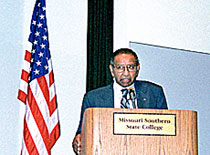World War II vet visits College

Retired Air Force Col. Kenneth Wofford, a World War II veteran and member of the Tuskegee Airmen, spoke April 24 in Webster Hall Auditorium on the topic of black aviators.
The social science department at Missouri Southern hosted a visit by retired Air Force Col. Kenneth Wofford on April 24 in Webster Hall Auditorium.
Wofford is a World War II veteran and a member of the Tuskegee Airmen.
“We had been planning on him to come since the beginning of the semester,” said Dr. Steven Wagner, assistant professor of history and coordinator for this event.
With an audience estimated at 250 people, Wofford spoke on the topic of black aviators and the development of the U.S. Air Force.
He included in his speech tests and procedures involved in the training at the Division of Aeronautics of Tuskegee Institute, individuals who played important roles in the program and the challenges these individuals had to face as blacks.
“Qualified but denied,” Wofford said. “That’s basically what it was.”
Wofford was born in 1922 in Oklahoma, but was raised in Carthage. He was one of the first to graduate from Lincoln High School, which was segregated at the time.
“I’m a product of segregated school, elementary through college,” Wofford said.
After graduating from high school, he headed to Tuskegee, Ala., where he took part in an experiment whose purpose was to see if blacks had the ability to fly aircraft in combat.
“All of us who went through the experiment were already prepared,” Wofford said.
He remained on active duty from World War II through Vietnam. After leaving the military, he began a second career as aeronautics operations director for the state of Minnesota.
Throughout his career, he has received many honors and awards, including the Elder Statesman of Aviation Award presented to him by the National Aeronautics Association.
Wagner said the main reason the department brought Wofford to speak at Southern was because he is involved with three different major topics that are overlapped: race relations, the World War II era and the history of the area. He also mentioned if Wofford had not been from this area, the event might not have been as interesting to others.
Your donation will support the student journalists of Missouri Southern State University. Your contribution will allow us to purchase equipment and cover our annual website hosting costs.



























